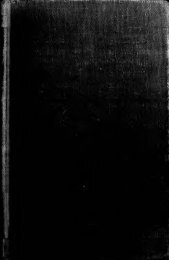Ecclesiastes - GA Barton - 1908.pdf
Ecclesiastes - GA Barton - 1908.pdf
Ecclesiastes - GA Barton - 1908.pdf
Create successful ePaper yourself
Turn your PDF publications into a flip-book with our unique Google optimized e-Paper software.
108 ECCLESIASTES<br />
16. Again I saw]. This vs. begins a new section, which is but<br />
loosely connected with the survey<br />
of times and seasons. In it<br />
Qoheleth expresses his views on the wickedness of men and their<br />
lack of superiority to animals. The vs. pictures the corrupt ad-<br />
ministration of Qoheleth's time. The opening of the vs. is similar<br />
12 - to ch. 2 u<br />
and 4 1<br />
,<br />
but contains the word again,<br />
which is unusual<br />
in such connections. Zo. maintains that this refers back to vs. 12,<br />
but it seems rather loosely to connect some independent observa-<br />
tions of the writer with the preceding. The place of judgmentthere<br />
was wickedness}. "Place" has been regarded by Hit., Gins.,<br />
Zo., Del., Sieg. and K6. (33ok) not as the object of "saw," but<br />
as ace. of place or pred. ace., the former being the favorite view.<br />
Gins, urges that it cannot be the obj. of "saw" on account of the<br />
accent, but, as Wr. points<br />
out in Gn. i 1<br />
, we have the ace. occurring<br />
in spite of this accent. I agree with Wr. and No. that the simplest<br />
construction is to regard it as an ace. here. Place of judgment] is<br />
the place of the administration of justice.<br />
Place of righteousness]<br />
is probably "the place of piety," "righteousness," as Gr. has sug-<br />
On this view<br />
gested, being, as in 15 - 16 - 20<br />
y<br />
9% equivalent to piety.<br />
Qoheleth maintains that wickedness prevails in the administration<br />
of government and in the practice of religion. See also critical<br />
note.<br />
17. The righteous and the wicked God will judge]. This verse<br />
interrupts the thought. It is, no doubt, the work of the Chasid<br />
glossator (see critical note). Del. notes that "judge" has a double<br />
meaning, referring to the vindication of the righteous as in Ps,<br />
7 8 26* , and to the punishment of the wicked. The idea that the<br />
with the con-<br />
righteous are vindicated is entirely out of harmony<br />
text. This is a strong reason for it regarding as the work of a<br />
glossator. On the emendation which underlies our rendering,<br />
see critical note. A time for every matter] is a distinct allusion<br />
in the verse to vv. 2-8.<br />
18. // is on account of the sons of men]. As Graetz observed, this<br />
verse connects directly with vs. 16, vs. 17 being, as already noted, an<br />
interpolation. Qoheleth's view is that the corruption<br />
in civil and<br />
religious affairs is God's way of demonstrating that men are, for<br />
all their intelligence and assumed superiority, really on a level with





